- Home
- Margaret Atwood
Moral Disorder Page 2
Moral Disorder Read online
Page 2
Tig comes in with a scroll. Tig is short for Tigris, a nickname bestowed on him by his erstwhile troops. Only a few intimates call him Tig. He’s frowning.
“Bad news?” I ask.
“The barbarians are invading,” he says. “They’ve crossed the Rhine.”
“Not before breakfast,” I say. He knows I can’t discuss weighty matters right after getting up. But I’ve been too abrupt: I see his stricken look, and I relent. “They’re always crossing the Rhine. You’d think they’d get tired of it. Our legions will defeat them. They always have before.”
“I don’t know,” says Tig. “We shouldn’t have let so many barbarians into the army. You can’t depend on them.” He spent a long time in the army himself, so his worry means something. On the other hand, it’s his general view that Rome is going to hell in a handcart, and I’ve noticed that most retired men feel like that: the world simply cannot function minus their services. It’s not that they feel useless; they feel unused.
“Please, sit down,” I say. “I’ll order you a nice piece of bread and honey, with figs.” Tig sits down. I don’t proffer the mare’s milk, though it would do him good. He knows I know he doesn’t like it. He hates being nagged about his health, which has been giving him some problems lately. Oh, make things stay the way they are, I pray to him silently.
“Did you hear?” I say. “They found a freshly cut-off head, hung up beside the old Celtic votive well.” Some escaped quarry worker who ran off into the woods, which they’ve been warned against, heaven knows. “Do you think they’re reverting to paganism? The Celts?”
“They hate us, really,” says Tig. “That memorial arch doesn’t help. It’s hardly tactful – Celts being defeated, Roman feet on their heads. Haven’t you caught them staring at our necks? They’d love to stick the knife in. But they’re soft now, they’re used to luxuries. Not like the northern barbarians. The Celts know that if we go under, they’ll go under too.”
He takes only one bite of the lovely bread. Then he stands up, paces around. He looks flushed. “I’m going to the baths,” he says. “For the news.”
Gossip and rumour, I think. Portents, forebodings; birds in flight, sheep’s entrails. You never know if the news is true until it pounces. Until it’s right on top of you. Until you reach out in the night and there’s no more breathing. Until you’re howling in darkness, wandering the empty rooms, in your white dress.
“We’ll get through it,” I say. Tig says nothing.
It’s such a beautiful day. The air smells of thyme, the fruit trees are in flower. But this means nothing to the barbarians; in fact, they prefer to invade on beautiful days. It provides more visibility for their lootings and massacres. These are the same barbarians who – I’ve heard – fill wicker cages with victims and set them on fire as a sacrifice to their gods. Still, they’re very far away. Even if they manage to cross the Rhine, even if they aren’t slain in thousands, even if the river fails to run red with their blood, they won’t get here for a long time. Not in our lifetime, perhaps. Glanum is in no danger, not yet.
The Art of Cooking and Serving
The summer I was eleven I spent a lot of time knitting. I knitted doggedly, silently, crouched over the balls of wool and the steel needles and the lengthening swath of knitwear in a posture that was far from easy. I’d learned to knit too early in life to have mastered the trick of twisting the strand around my index finger – the finger had been too short – so I had to jab the right-hand needle in, hold it there with two left-hand fingers, then lift the entire right hand to loop the wool around the tip of the needle. I’d seen women who were able to knit and talk at the same time, barely glancing down, but I couldn’t do it that way. My style of knitting required total concentration and caused my arms to ache, and irritated me a lot.
What I was knitting was a layette. A layette was a set of baby garments you were supposed to dress the newborn baby in so it would be warm when it was brought home from the hospital. At the very least you needed to have two thumbless mittens, two stubby booties, a pair of leggings, a jacket, and a bonnet, to which you could add a knitted blanket if you had the patience, as well as a thing called a soaker. The soaker looked like a pair of shorts with pumpkin-shaped legs, like the ones in pictures of Sir Francis Drake. Cloth diapers and rubber baby pants were prone to leaks: that’s what the soaker was for. But I was not going to knit the soaker. I hadn’t yet got around to visualizing the fountains, the streams, the rivers of pee a baby was likely to produce.
The blanket was tempting – there was one with rabbits on it that I longed to create – but I knew I had to draw the line somewhere because I didn’t have all the time in the world. If I dawdled, the baby might arrive before I was ready for it and be forced to wear some sort of mismatched outfit put together out of hand-me-downs. I’d started on the leggings and the mittens, as being fairly simple – mostly alternate rows of knit and purl, with some ribbing thrown in. That way I could work up to the jacket, which was more complicated. I was saving the bonnet to the last: it was going to be my chef-d’oeuvre. It was to be ornamented with satin ribbons to tie under the baby’s chin – the possibilities of strangulation through ties like this had not yet been considered – and with huge ribbon rosettes that would stick out on either side of the baby’s face like small cabbages. Babies dressed in layettes, I knew from the pictures in the Beehive pattern book, were supposed to resemble confectionary – clean and sweet, delicious little cakelike bundles decorated with pastel icing.
The colour I’d chosen was white. It was the orthodox colour, though a few of the Beehive patterns were shown in an elfin pale green or a practical yellow. But white was best: after it was known whether the baby was a boy or a girl I could add the ribbons, blue or pink. I had a vision of how the entire set would look when finished – pristine, gleaming, admirable, a tribute to my own goodwill and kindness. I hadn’t yet realized it might also be a substitute for them.
I was knitting this layette because my mother was expecting. I avoided the word pregnant, as did others: pregnant was a blunt, bulgy, pendulous word, it weighed you down to think about it, whereas expecting suggested a dog with its ears pricked, listening briskly and with happy anticipation to an approaching footstep. My mother was old for such a thing: I’d gathered this by eavesdropping while she talked with her friends in the city, and from the worried wrinkles on the foreheads of the friends, and from their compressed lips and tiny shakes of the head, and from their Oh dear tone, and from my mother saying she would just have to make the best of it. I gathered that something might be wrong with the baby because of my mother’s age; but wrong how, exactly? I listened as much as I could, but I couldn’t make it out, and there was no one I could ask. Would it have no hands, would it have a little pinhead, would it be a moron? Moron was a term of abuse, at school. I wasn’t sure what it meant, but there were children you weren’t supposed to stare at on the street, because it wasn’t their fault, they had just been born that way.
I’d been told about the expectant state of my mother in May, by my father. It had made me very anxious, partly because I’d also been told that until my new baby brother or sister had arrived safely my mother would be in a dangerous condition. Something terrible might happen to her – something that might make her very ill – and it was all the more likely to happen if I myself did not pay proper attention. My father did not say what this thing was, but his gravity and terseness meant that it was a serious business.
My mother – said my father – was not supposed to sweep the floor, or carry anything heavy such as pails of water, or bend down much, or lift bulky objects. We would all have to pitch in, said my father, and do extra tasks. It would be my brother’s job to mow the lawn, from now until June, when we would go up north. (Up north there was no lawn. In any case my brother wouldn’t be there: he was heading off to a camp for boys, to do things with axes in the woods.) As for me, I would just have to be generally helpful. More helpful than usual, my father added in a manner
that was meant to be encouraging. He himself would be helpful too, of course. But he couldn’t be there all the time. He had some work to do, when we would be at what other people called the cottage but we called the island. (Cottages had iceboxes and gas generators and water-skiing, all of which we lacked.) It was necessary for him to be away, which was unfortunate, he continued. But he would not be gone for very long, and he was sure I would be up to it.
I myself was not so sure. He always thought I knew more than I knew, and that I was bigger than I was, and older, and hardier. What he mistook for calmness and competence was actually fright: that was why I stared at him in silence, nodding my head. The danger that loomed was so vague, and therefore so large – how could I even prepare for it? At the back of my mind, my feat of knitting was a sort of charm, like the fairy-tale suits of nettles mute princesses were supposed to make for their swan-shaped brothers, to turn them back into human beings. If I could only complete the full set of baby garments, the baby that was supposed to fit inside them would be conjured into the world, and thus out of my mother. Once outside, where I could see it – once it had a face – it could be dealt with. As it was, the thing was a menace.
Thus I knitted on, with single-minded concentration. I finished the mittens before we went up north; they were more or less flawless, except for the odd botched stitch. After I got to the island, I polished off the leggings – the leg that was shorter could be stretched, I felt. Without pause I started on the jacket, which was to have several bands of seed stitch on it – a challenge, but one I was determined to overcome.
Meanwhile my mother was being no use at all. At the beginning of my knitting marathon she’d undertaken to do the booties. She did know how to knit, she’d knitted in the past: the pattern book I was using had once been hers. She could turn heels, a skill I hadn’t quite mastered. But despite her superior ability, she was slacking off: all she’d done so far was half a bootie. Her knitting lay neglected while she rested in a deck chair, her feet up on a log, reading historical romances with horseback riding and poisoning and swordplay in them – I knew, I’d read them myself – or else just dozing, her head lying slackly on a pillow, her face pale and moist, her hair damp and lank, her stomach sticking out in a way that made me feel dizzy, as I did when someone else had cut their finger. She’d taken to wearing an old smock she’d put away in a trunk, long ago; I remembered using it for dressing up at Halloween once, when I was being a fat lady with a purse. It made her look poor.
It was scary to watch her sleeping in the middle of the day. It was unlike her. Normally she was a person who went for swift, purposeful walks, or skated around rinks in winter at an impressive speed, or swam with a lot of kicking, or rattled up the dishes – she called it rattling them up. She always knew what to do in an emergency, she was methodical and cheerful, she took command. Now it was as if she had abdicated.
When I wasn’t knitting, I swept the floor diligently. I pumped out pails and pails of water with the hand pump and lugged them up the hill one at a time, spilling water down my bare legs; I did the washing in the zinc washtub, scrubbing the clothes with Sunlight soap on the washboard, carting them down to the lake to rinse them out, hauling them up the hill again to hang them on the line. I weeded the garden, I carried in the wood, all against the background of my mother’s alarming passivity.
Once a day she went for a swim, although she didn’t swim energetically, not the way she used to, she just floated around; and I would go in too, whether I wanted to or not: I had to prevent her from drowning. I had a fear of her sinking down suddenly, down through the cold brownish water, with her hair fanning out like seaweed and her eyes gazing solemnly up at me. In that case I would have to dive down and get my arm around her neck and tow her to shore, but how could I do that? She was so big. But nothing like that had happened yet, and she liked going into the water; it seemed to wake her up. With only her head sticking out, she looked more like herself. At such times she would even smile, and I would have the illusion that everything was once again the way it was supposed to be.
But then she would emerge, dripping – there were varicose veins on the backs of her legs, I couldn’t avoid seeing them, although they embarrassed me – and make her way with painful slowness up to our cabin, and put together our lunch. The lunch would be sardines, or peanut butter on crackers, or cheese if we had any, and tomatoes from the garden, and carrots I’d dug out and washed. She didn’t appear much interested in eating this lunch, but she chewed away at it anyway. She would make an effort at conversation – how was my knitting coming along? – but I didn’t know what to say to her. I couldn’t understand why she’d chosen to do what she’d done – why she’d turned herself into this listless, bloated version of herself, thus changing the future – my future – into something shadow-filled and uncertain. I thought she’d done it on purpose. It didn’t occur to me that she might have been ambushed.
It was mid-August: hot and oppressive. The cicadas sang in the trees, the dry pine needles crackled underfoot. The lake was ominously still, the way it was when thunder was gathering. My mother was dozing. I sat on the dock, slapping at the stable flies and worrying. I felt like crying, but I could not allow myself to do that. I was completely alone. What would I do if the dangerous thing – whatever it was – began to happen? I thought I knew what it might be: the baby would start to come out, too soon. And then what? I couldn’t exactly stuff it back in.
We were on an island, there were no other people in sight, there was no telephone, it was seven miles by boat to the nearest village. I would have to start the outboard motor on our clunky old boat – I knew how to do this, though pulling the cord hard enough was almost beyond my strength – and go all the way to the village, which could take an hour. From there I could telephone for help. But what if the motor wouldn’t start? That had been known to happen. Or what if it broke down on the way? There was a tool kit, but I’d learned only the most elementary operations. I could fix a shear pin, I could check a gas line; if those things didn’t work I would have to row, or wave and yell at passing fishermen, if any.
Or I could use the canoe – put a stone in the stern to weight it down, paddle from the bow end, as I’d been taught. But that method would be useless in a wind, even a light wind: I wasn’t strong enough to hold a course, I would be blown sideways.
I thought of a plan of last resort. I would take the canoe over to one of the small offshore islands – I could get that far, no matter what. Then I would set fire to the island. The smoke would be seen by a fire ranger, who would send a float plane, and I would stand on the dock in full view and jump up and down and wave a white pillowcase. This could not fail. The risk was that I would set the mainland on fire as well, by accident. Then I would end up in jail as an arsonist. But I would just have to do it anyway. It was either that, or my mother would … Would what?
Here my mind cut out, and I ran up the hill and walked softly past my sleeping mother and into the cabin, and got out the jar full of raisins, and made my way to the large poplar tree where I always went when I’d come to the edge of an unthinkable thought. I propped myself against the tree, crammed a handful of raisins into my mouth, and plunged into my favourite book.
This book was a cookbook. It was called The Art of Cooking and Serving, and I’d recently thrown over all novels and even The Guide to Woodland Mushrooms and devoted myself to it entirely. It was by a woman called Sarah Field Splint, a name I trusted. Sarah was old-fashioned and dependable, Field was pastoral and flowery, and Splint – well, there could be no nonsense and weeping and hysteria and doubts about the right course of action with a woman called Splint by your side. This book dated from the olden days, ten years before I was born; it had been put out by the Crisco company, a manufacturer of vegetable shortening, at the beginning of the Depression, when butter had become expensive – said my mother – so all the recipes in it had Crisco in them. We always had lots of Crisco on the island, because butter went bad in the heat. Crisco o
n the other hand was virtually indestructible. In the long ago, before she’d started expecting, my mother had used it to make pies, and her writing could be found here and there among the recipes: Good!! she’d written. Or, Use half white, half brown.
It wasn’t the recipes that held me in thrall, however. It was the two chapters at the front of the book. The first was called “The Servantless House,” the second “The House with a Servant.” Both of them were windows into another world, and I peered through them eagerly. I knew they were windows, not doors: I couldn’t get in. But what entrancing lives were being lived in there!
Sarah Field Splint had strict ideas on the proper conduct of life. She had rules, she imposed order. Hot foods must be served hot, cold foods cold. “It just has to be done, however it is accomplished,” she said. That was the kind of advice I needed to hear. She was firm on the subject of clean linen and shining silver. “Better never to use anything but doilies, and keep them immaculately fresh, than to cover the table for even one meal with a cloth having a single spot on it,” she ordered. We had oilcloth on our table, and stainless steel. As for doilies, they were something beyond my experience, but I thought it would be elegant to have some.
Despite her insistence on the basics, Sarah Field Splint had other, more flexible values. Mealtimes must be enjoyed; they must have charm. Every table must have a centrepiece: a few flowers, an arrangement of fruits. Failing that, “some tiny ferns combined with a bit of partridge vine or other coloured woodsy thing in a low bowl or delicate wicker basket” would do the trick.
How I longed for a breakfast tray with a couple of daffodils in a bud vase, as pictured, or a tea table at which to entertain “a few choice friends” – who would these friends be? – or, best of all, breakfast served on a side porch, with a lovely view of “the winding river and the white church spire sailing out of the trees on the opposite bank.” Sailing – I liked that. It sounded so peaceful.

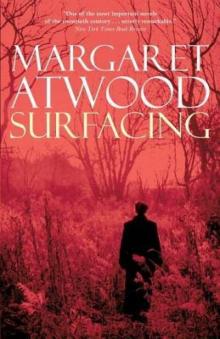 Surfacing
Surfacing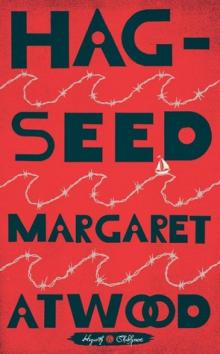 Hag-Seed
Hag-Seed Oryx and Crake
Oryx and Crake The Heart Goes Last
The Heart Goes Last The Handmaid's Tale
The Handmaid's Tale Lady Oracle
Lady Oracle Good Bones and Simple Murders
Good Bones and Simple Murders The Robber Bride
The Robber Bride Life Before Man
Life Before Man Alias Grace
Alias Grace The Blind Assassin
The Blind Assassin Cat's Eye
Cat's Eye The Testaments
The Testaments The Penelopiad
The Penelopiad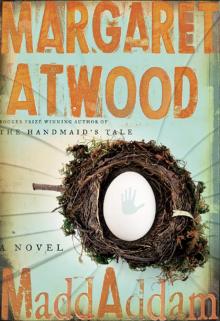 MaddAddam
MaddAddam Dancing Girls & Other Stories
Dancing Girls & Other Stories On Writers and Writing
On Writers and Writing Selected Poems II (1976-1986)
Selected Poems II (1976-1986) Wilderness Tips
Wilderness Tips Dearly
Dearly The Tent
The Tent Bluebeard's Egg
Bluebeard's Egg The Edible Woman
The Edible Woman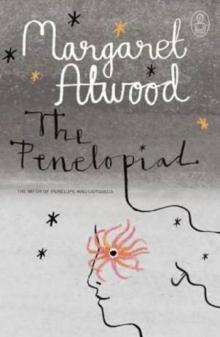 The Penelopiad: The Myth of Penelope and Odysseus
The Penelopiad: The Myth of Penelope and Odysseus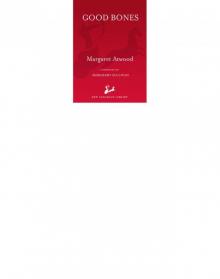 Good Bones
Good Bones I Dream of Zenia with the Bright Red Teeth
I Dream of Zenia with the Bright Red Teeth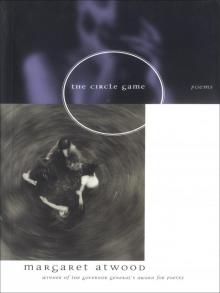 Circle Game
Circle Game Choke Collar: Positron, Episode Two
Choke Collar: Positron, Episode Two Stone Mattress: Nine Tales
Stone Mattress: Nine Tales The MaddAddam Trilogy
The MaddAddam Trilogy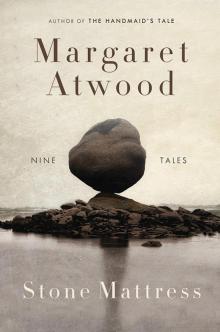 Stone Mattress
Stone Mattress Power Politics
Power Politics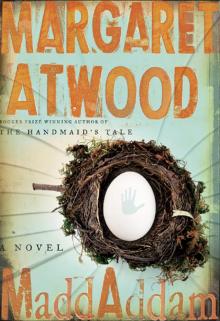 MaddAddam 03 - MaddAddam
MaddAddam 03 - MaddAddam I’m Starved for You (Kindle Single)
I’m Starved for You (Kindle Single) Murder in the Dark
Murder in the Dark In Other Worlds
In Other Worlds Dancing Girls
Dancing Girls Moral Disorder
Moral Disorder